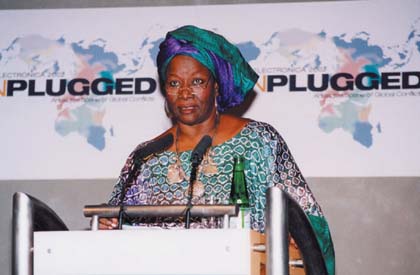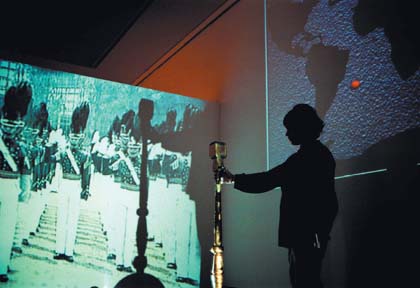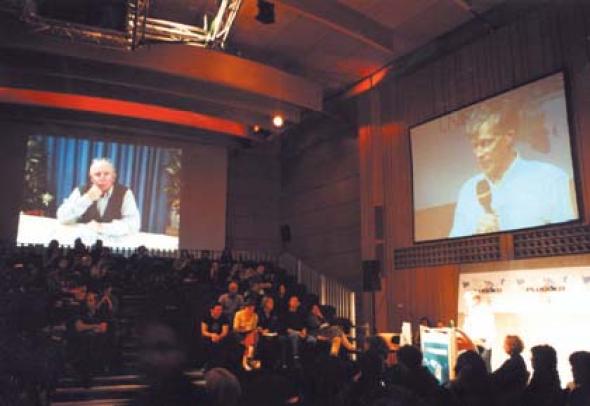Pull the Plug
Armin Medosch visits Ars Electronica and finds that it takes more than a good festival theme to make a leopard this old change its spots
THE FESTIVAL
Ars Electronica, launched in 1979, is probably the oldest and biggest festival for the electronic arts worldwide. The Austrian city of Linz, where the festival is held on an annual basis, has transformed itself since then from a centre of steel and chemical production into a digital service economy. Even though the festival was once much smaller, it has never experienced an 'underground' phase. From the very beginning it was conceived and organised by a local triad of godfathers from local politics, arts and the ORF (Österreichische Rundfunk). It is now considered an unqualified success story. This was illustrated by the opening speeches of the mayor of Linz and the govenor of Upper Austria, who stressed the importance of the festival for the transformation of town and region giving it, in their words, ‘a headstart in the global information economy’.
THIS YEAR’S THEME
The reputation of ’Ars’ has, in recent years, suffered from a succession of unfortunate thematic choices. From ’Memesis’ '96, through ‘Fleshfactor’ '97, ‘Life Science’ '99 to ‘Next Sex’ 2000, Ars has been criticised for choosing biological metaphors and carelessly transferring them to the fields of information technology and culture. Minor scandals have erupted at conferences over past years, when Social Darwinists and behavioural evolutionary theorists were given a disproportionate amount of space and attention in which to elaborate their screwy theories. Last year’s ambiguous ‘Takeover’ theme marked an attempt to move on towards a more socially responsible, if still muddled, festival policy. With this year’s ‘Unplugged – Art as the Scene of Global Conflict’, Ars seems to have got it right. But, a good theme alone does not a festival make.
THE POLITICS OF THE PROGRAMME
The statement by the festival directors Gerfried Stocker and Christine Schoepf explains that the festival intends to focus, this year, on the ‘blind spots of globalisation’. For some reason – and without any further explanation – those 'blind spots' seem to have been equated almost entirely with Africa. As much as it should be welcomed that Africans received an unprecedented level of representation at this year’s Ars, at least in numbers, this strategy was not without dangers in a country as ‘structurally’ racist as Austria. The representation of African culture – seemingly in tune with Nigerian Okwui Enwezor’s Documenta 11 – had a certain tokenistic quality to it. Africans appeared to have been 'included' largely for the sake of political correctness, but not necessarily with regards to the content of their contribution. I could not escape the feeling that African participation was instrumentalised and that there was an invisible glass shield between the newly admitted and the rest of the Ars scene. Westerners should not forget that it is their privilege to be able to contemplate 'unplugging' themselves. As one festival visitor said, if the West wants to unplug, then they should do it now, simply pull the plug...
THE CONFERENCE
The conference produced another encounter with conference circuit die-hards such as Saskia Sassen and Paul Virilio. It had its interesting moments but lacked consistency and was overshadowed by that meta-narrative 9-11. Many speakers seemed to struggle to make connections between the political theme and art. The conference lasted five days and less would definitely have been more.
Saskia Sassen scored some points with the audience with some dismissive remarks about Bush Jr.’s War on Terrorism. She ridiculed American unilateralism with references to its ‘G1 policies’. Her excursions into the debate around intellectual property were well meaning but offered nothing new. It would have been better if she’d stuck to her favoured topic, Global Cities. Her text in the catalogue offers a re-consideration of this topic, explaining that the ‘vast new economic topography that is implemented through electronic space is one moment, one fragment of an even vaster economic chain that is in good part embedded in non-electronic spaces,’ and that the majority of workers in this area are immigrants, a fact often overlooked in ‘mainstream accounts of the global economy’. She points out that both the financial services and the infrastructural parts of Global Cities have global and local elements and concludes that ‘the specific dynamics of de-nationalisation [...] have contributed to creating operational and conceptual openings for other actors and subjects.’ Regrettably, she fails to identify any specific examples of such vital 'openings'.
Paul Virilio spoke in a video conference with Derrick de Kerkhove. Sitting between two plants and in front of a blurry white pixilated space that could have been a fridge or a door, the symbolic significance of the set-up was the most debated aspect of his talk. He sees the world turned into a ‘cosmic ghetto’ and, put bluntly, seems to be worried about overcrowding and too much media propaganda. I am sure that passengers of public transport will sympathise, but why everything for Virilio has to reach eschatological proportions is beyond me. Maybe he should stop watching so much CNN.
The artist Peter Fend clearly does see a special role for art in times of perpetual warfare and crisis. He doesn’t want to make art but history. Ocean Earth, the artists’ collective to which he belongs, [see Mute, issue 22], is looking for client states to commission them to carry out large-scale ecological projects, such as the revitalisation of deserts and marshes. Fend also proposes drawing new state borders along watersheds. Yet the ‘Art of the State’ as his talk was called, is unpleasantly reminiscent of art’s instrumentalised role within totalitarian societies. Fend, it seems, loves Marinetti and other artists of this caliber and would require a Mussolini to carry out his plans.
 > Aminata Traoré, Unplugged symposium, Ars Electronica 2002. Picture by Sabine Starmayr
> Aminata Traoré, Unplugged symposium, Ars Electronica 2002. Picture by Sabine Starmayr
A voice of reason was offered by Aminata Traoré, Mali’s former Minister of Culture. She criticised the narrative underpinning the 'wiring Africa' project by connecting its ‘utopian’ discourse on the ‘universalising and pacific’ virtues of telecommunications to the neoliberal agenda inherent in failed development aid and debt reducement programmes. Looking back at the formation of the International Telecommunications Union and its predecessors, she drew a direct connection between colonial imperialism and its latterday pacific and humanist repackaging as IT.
THE ART
The exhibitions were spread across a number of venues, from the Brucknerhaus (main venue) to the OK (Open Culture House), where the winners and nominees of the Prix Ars Electronica were shown. Elsewhere the AEC contained a show on augmented reality. Ars Electronica has always claimed to show ‘the best of everything’. The problem with this approach is that here media art can be seen carrying too much historical baggage. Obsolete concepts of interactivity, including the ‘demo technology’ of the 3D immersive CAVE, perpetuate themselves from year to year. Also a lot of work seems to be too obsessed with the ‘interface’ and is driven more by technology than artistic ideas or critical thinking. But, as Gerfried Stocker pointed out, you cannot expect a fundamental change from Ars Electronica. It is a festival about the trinity of technology, art and society and despite the fact that the festival’s flavour can be minorly adjusted, it’s duty is to reflect the contemporary practice of that artistic sector. Using this as a pretext, Ars is, to some degree, a festival on auto-pilot.
 > Installation shot of Power Game, by Aurelia Mihai. Picture by the artist.
> Installation shot of Power Game, by Aurelia Mihai. Picture by the artist.
One notable exception to this laissez-faire curatorial approach was the Change the Map exhibition, described in the catalogue as presenting artistic approaches ’that can be subsumed under the heading of world projections and that have in common a reference to cartography.’ How to map, measure and visualise networks, how to represent power structures, distributions of wealth or connectivity? These are all very interesting questions with rich artistic outcomes. Mapping has a big future, but this show also revealed its problematic sides. Most of the work got stuck with visualisation problems and decided to opt for abstractions. But how is the meta-map determined and how can we negotiate the parameters of map making? In too many maps, Africa is that empty spot at the bottom of the screen. The injunction ’Change the Map’ was a good departure point, and the use of Buckminster Fuller's world map in the festival logo offered, perhaps, the promise, of some deeper reflections on the matter in the future.
THE AWARD WINNERS
The project Carnivore by Radical Software Group (RSG) won the Golden Nica in the category Net Vision. Its name derives from a spying tool, used by the FBI for snooping on the net communication of US citizens, and is allegedly able to filter the net by special key words. But RSG’s Carnivore shares little technological ground with its namesake. As Alex Galloway, one if its creators, openly acknowledges it uses a technology as old as the net, a system administration tool that shows all the different types of data packets that pass through a certain router. This data stream is channeled to customised programs written by RSG which guest artists are invited to use in order to generate different versions of front end clients. But, crucially, most of these clients are pretty little pieces of work that turn traffic data into abstract visualisations. Surveillance is such a big issue, especially in the current climate of the War Against Terrorism, when law enforcement agencies worldwide have granted themselves the most lenient communication interception capabilities ever. Carnivore pulls back from addressing these issues in their entirety and instead chooses to make a tongue-in-cheek, US geek-boy joke out of it.
David Rokeby won a Golden Nica for his work n-cha(n)t in the Interactive Art category. This is a totally different case. He presents himself in a much more grown-up way, continuing a line of work in media art that connects to AI and computer linguistics. He is also located in the tradition of the hardware-heavy ‘installation’ artist, who attempts the transposition of the artwork’s aura to the digital environment through the materiality of kit. In the work n-cha(n)t, a group of six computers are ‘conversing’ with each other while treating human speech input as an unwanted interference. The suggestion that this raises our awareness of difference or Otherness sounded very far-fetched to me. But what is certain is that with this kind of work, you could probably win a 'Prix' ten years from now, as you could also have done ten years ago.
CONCLUSION
Ars Electronica offers the relatively well-oiled machinery of live-acts, conference talks, impromptu meetings and large scale installations, whose logistical complexity and technological overheads cannot fail to impress. In this respect some credit must be given to the technical crew who are probably now in their second or third generation and have developed a local culture of how to run such a festival. Based on this experience I think that Ars could take the plunge and acknowledge that it doesn’t really have an audience but rather a clientele or constituency. There is no need to treat specialists who have traveled from as far as Africa and Japan as an 'audience' with the simultaneously protective and patronising attitude that this entails. In my opinion it would also be better if the conceptual screw could be turned tighter, and more curatorial effort and direction given to the individual projects and situations. Despite the necessary criticism of this friendly dinosaur of media art, the continuing commitment of the local power brokers to Ars Electronica should be seen as a good thing, albeit motivated by all the wrong reasons. There are not many annual events that have such a wide angle lens and continue to try to ask some of the same old but nonetheless often relevant questions.
Declaration of Interest The writer of this article participated in the festival in 1989 as part of the group Radio Subcom, and this year presented the online project Kingdom of Piracy together with co-curators Shu Lea Cheang and Yukiko Shikata [http://www.aec.at/kop]
Armin Medosch is a writer, artist and curator. He is a co-founder of the online magazine Telepolis and, together with Janko Röttgers, he edited Netzpiraten (2001)
Mute Books Orders
For Mute Books distribution contact Anagram Books
contact@anagrambooks.com
For online purchases visit anagrambooks.com








